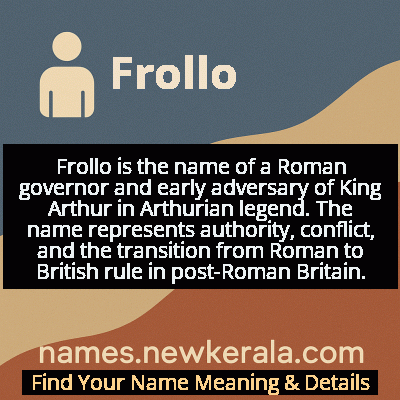Frollo Name Meaning & Details
Origin, Popularity, Numerology Analysis & Name Meaning of Frollo
Discover the origin, meaning, and cultural significance of the name FROLLO. Delve into its historical roots and explore the lasting impact it has had on communities and traditions.
Name
Frollo
Gender
Male
Origin
Arthurian
Lucky Number
6
Meaning of the Name - Frollo
Frollo is the name of a Roman governor and early adversary of King Arthur in Arthurian legend. The name represents authority, conflict, and the transition from Roman to British rule in post-Roman Britain.
Frollo - Complete Numerology Analysis
Your Numerology Number
Based on Pythagorean Numerology System
Ruling Planet
Venus
Positive Nature
Harmonious, responsible, caring, and artistic.
Negative Traits
Overly idealistic, superficial, possessive, or jealous.
Lucky Colours
Pink, turquoise.
Lucky Days
Friday.
Lucky Stones
Diamond, turquoise.
Harmony Numbers
2, 3, 9.
Best Suited Professions
Artists, musicians, teachers, healthcare workers.
What People Like About You
Warmth, nurturing nature, artistic flair.
Famous People Named Frollo
Frollo
Roman Governor
Early adversary of King Arthur in Arthurian legend, representing Roman authority in Gaul
Frollo
Literary Character
Significant antagonist figure in medieval Arthurian romances and historical texts
Frollo
Mythological Figure
Symbolic representation of the conflict between Roman and British sovereignty in Arthurian tradition
Name Variations & International Equivalents
Click on blue names to explore their detailed meanings. Gray names with will be available soon.
Cultural & Historical Significance
In later French Arthurian romances, Frollo's role was expanded and refined, becoming a more developed antagonist figure whose defeat marks a crucial milestone in Arthur's rise to power. His character serves as a political and military challenge that demonstrates Arthur's ability to defend Britain against external threats. The cultural significance of Frollo extends beyond mere opposition—he represents the established order that must be overcome for new cultural and political directions to emerge. His defeat symbolizes the triumph of British identity over Roman influence and the establishment of Arthur's legitimacy as a ruler capable of protecting and leading his people against powerful adversaries.
Extended Personality Analysis
In Arthurian tradition, characters named Frollo typically exhibit a complex blend of authoritative competence and tragic rigidity. As a Roman governor, Frollo demonstrates strong leadership qualities, strategic military thinking, and organizational capabilities that made him an effective administrator. He possesses confidence in his position and training, often displaying the arrogance that comes with established power and Roman military tradition. His personality reflects the disciplined, methodical approach of Roman governance, contrasting with Arthur's more intuitive and revolutionary leadership style. Frollo shows determination and resilience in conflict, refusing to yield his authority easily and maintaining his commitment to Roman supremacy even when facing determined opposition.
However, Frollo's personality also reveals significant limitations that contribute to his downfall. His adherence to traditional military tactics and reliance on established power structures shows an inability to adapt to Arthur's unconventional approaches and the changing political landscape. There's a tragic element to his character—his very competence and confidence become liabilities when facing a opponent who operates outside conventional frameworks. Frollo represents the danger of becoming too invested in maintaining the status quo and failing to recognize when fundamental shifts in power are occurring. His personality ultimately serves as a cautionary example about the limitations of rigid thinking and the importance of adaptability in leadership, particularly during periods of significant cultural and political transition.
Modern Usage & Popularity
In modern times, the name Frollo remains exceptionally rare and is primarily confined to academic, literary, and artistic contexts rather than practical usage as a given name. Its strong association with an Arthurian antagonist who is defeated and killed by King Arthur has prevented it from gaining popularity in contemporary naming practices. The name occasionally appears in historical fiction novels, fantasy literature, and Arthurian adaptations where authors seek authentic period names or wish to reference specific Arthurian characters. In scholarly circles, Frollo is recognized as an important figure in Arthurian studies, representing the Roman-British conflict dynamic. There are no significant popularity trends for this name in modern birth records, and its usage is largely symbolic or referential rather than practical. The name's continued presence is maintained through its importance in Arthurian scholarship and occasional appearances in creative works that reinterpret Arthurian mythology for modern audiences.
Symbolic & Spiritual Meanings
Symbolically, the name Frollo represents the confrontation between established authority and emerging power, serving as a metaphorical obstacle that must be overcome for transformation to occur. He embodies the old order—structured, traditional, and rooted in imperial systems—that resists the new vision represented by Arthur. The character symbolizes the necessary elimination of outdated power structures to make way for innovative leadership and cultural evolution. Frollo's defeat represents the triumph of local identity over foreign influence and the assertion of independent sovereignty against imperial control. Metaphorically, he stands for all forms of resistance to necessary change, the dangers of rigid adherence to tradition, and the inevitable downfall that comes from failing to adapt to evolving circumstances. His character serves as a symbolic threshold that the hero must cross to prove his worth and establish his legacy, making Frollo an essential component in the hero's journey narrative structure that underlies the Arthurian mythos.

